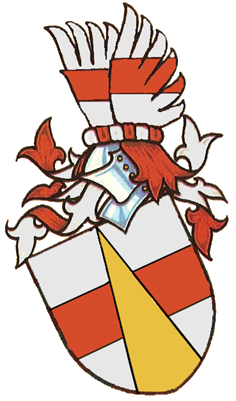Rachet d'Everard (crusader): Difference between revisions
mNo edit summary Tag: 2017 source edit |
mNo edit summary Tag: 2017 source edit |
||
| Line 17: | Line 17: | ||
}} | }} | ||
'''Rachet d'Everard''' (also ''Radzig Eberhard'', 1433 | '''Rachet d'Everard''' (also ''Radzig Eberhard'', 1433 – February 22, 1498) was a [[East Goths|Gothic]]-born [[Yonderre|Yonderian]] crusader, [[Knights of the Oblong Table|Knight of the Oblong Table]], [[Marshal of Yonderre|marshal]] and [[Nobility in Yonderre|nobleman]] who served the Crusader Count [[Joanus de Martigueux]] during and in the years after the [[Conquest of Joanusterra]]. | ||
Not much is known of d'Everard's early life. He was first mentioned in a writ from 1462 as a lieutenant of de Martigueux's crusader army. He took part in the [[Conquest of Joanusterra|crusader invasion of Gothica]] on the side of the crusaders and is noted in a manual from the late fifteenth century as a skilled commander and fighter in his own right. d'Everard was made a [[Knights of the Oblong Table|Knight of the Oblong Table]] in 1467 by [[Joanus de Martigueux]] in recognition of his service and a [[Barons of Yonderre|Baron]] in 1470, creating the [[House d'Everard]]. He is noted for his motto ''Du doch nicht!'', which translates from [[East Gothic language|Gothic]] as "Definitely not you!". The motto refers to an incident during the [[Conquest of Joanusterra]] wherein d'Everard at the head of a small force was offered to surrender to a numerically superior Gothic army. When asked how he thought he could possibly win the battle by a Gothic commander, d'Everard responded laconically with ''Du doch nicht!''. | Not much is known of d'Everard's early life. He was first mentioned in a writ from 1462 as a lieutenant of de Martigueux's crusader army. He took part in the [[Conquest of Joanusterra|crusader invasion of Gothica]] on the side of the crusaders and is noted in a manual from the late fifteenth century as a skilled commander and fighter in his own right. d'Everard was made a [[Knights of the Oblong Table|Knight of the Oblong Table]] in 1467 by [[Joanus de Martigueux]] in recognition of his service and a [[Barons of Yonderre|Baron]] in 1470, creating the [[House d'Everard]]. He is noted for his motto ''Du doch nicht!'', which translates from [[East Gothic language|Gothic]] as "Definitely not you!". The motto refers to an incident during the [[Conquest of Joanusterra]] wherein d'Everard at the head of a small force was offered to surrender to a numerically superior Gothic army. When asked how he thought he could possibly win the battle by a Gothic commander, d'Everard responded laconically with ''Du doch nicht!''. | ||
Revision as of 08:19, 8 September 2023
Rachet d'Everard | |
|---|---|
 Coat of arms granted to the Rachet d'Everard by Joanus de Martigueux in 1470 | |
| Born | Radzig Eberhard 1433 |
| Died | February 22, 1498 (aged 64–65) |
| Occupation | Marshal |
Rachet d'Everard (also Radzig Eberhard, 1433 – February 22, 1498) was a Gothic-born Yonderian crusader, Knight of the Oblong Table, marshal and nobleman who served the Crusader Count Joanus de Martigueux during and in the years after the Conquest of Joanusterra.
Not much is known of d'Everard's early life. He was first mentioned in a writ from 1462 as a lieutenant of de Martigueux's crusader army. He took part in the crusader invasion of Gothica on the side of the crusaders and is noted in a manual from the late fifteenth century as a skilled commander and fighter in his own right. d'Everard was made a Knight of the Oblong Table in 1467 by Joanus de Martigueux in recognition of his service and a Baron in 1470, creating the House d'Everard. He is noted for his motto Du doch nicht!, which translates from Gothic as "Definitely not you!". The motto refers to an incident during the Conquest of Joanusterra wherein d'Everard at the head of a small force was offered to surrender to a numerically superior Gothic army. When asked how he thought he could possibly win the battle by a Gothic commander, d'Everard responded laconically with Du doch nicht!.
Rachet d'Everard died in 1498 and his estates were divided between his sons Phillipe and Falco. d'Everard also had three daughters who survived to adulthood, although their names are unknown.